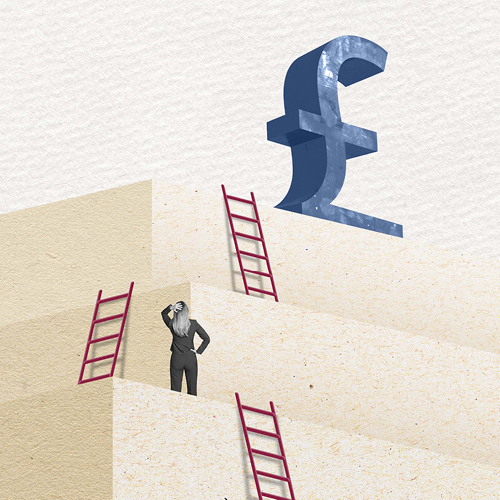Reducing the impact of capital gains tax

What you need to know
-
Capital gains tax is charged on many assets when you sell – it can reduce your overall return
-
Plan the time of your sale and use tax reliefs to enhance your returns
-
The CGT tax allowance is £6,000 in the 2023-24 tax year and will fall to £3,000 in 2024-25
-
Always consult a tax adviser before making major financial decisions
Selling an asset is often a major financial decision. Yet while considerable thought is usually given to how much you hope to sell for and when you’d like to complete the transaction, the tax implications of the sale can be overlooked.
Capital gains tax (CGT) can quickly change the profile of your return on an investment. This tax can be as high as 28%, meaning investors must think carefully about when they sell and make the most of annual allowances.
In the 2021-22 tax year 394,000 taxpayers shared a CGT bill of £16.7 billion. But with careful planning it is possible to ensure that you don’t make a large addition to that total.
In this guide we will explain some key considerations for investors looking to sell, but please note Rothschild & Co does not provide tax advice and you should contact a tax adviser before making any financial decisions. We work with a network of tax experts who can help you make the best decision for your circumstances.
In the 2021-22 tax year 394,000 taxpayers shared a CGT bill of £16.7 billion. But with careful planning it is possible to ensure that you don’t make a large addition to that total."
What is capital gains tax and how is it calculated?
CGT is payable when you dispose of an asset that has risen in value. You pay tax on the growth in value – known as the ‘gain’ – rather than the sale price you receive.1
For example, if you bought a painting for £10,000 in 2022 and sold it for £20,000 a year later, your taxable gain would be £10,000.
CGT will not only apply to the sale of an asset, but also to many gifts. In these cases CGT is calculated by reference to the market value of the asset at the date of the gift.
The tax is paid by individuals, trustees and personal representatives if they are UK resident. Those not resident in the UK pay CGT on UK property.
Here are some other key facts:
- CGT is applied at 20% on the sale of most investments. Shares are not readily identifiable as separate assets so for CGT purposes the cost of your shares in a company are ‘pooled’
- Cryptocurrency is an asset for CGT purposes and so care is needed in relation to such transactions
What is exempt from capital gains tax?
- You don’t pay CGT on ISAs, premium bonds, or betting or lottery winnings. Gifts to charity are also exempt from CGT
- Companies pay corporation tax on the profits they make, rather than being liable for CGT.
If you sell an asset at a loss, you can offset that loss against a gain you make in the same or a subsequent tax year. However, losses cannot be carried back to prior tax years and you must claim your loss on your tax return.2
What rate will I pay?
The rate at which you pay CGT will depend on your personal circumstances, including your income tax band.
If you’re a higher or additional rate taxpayer you’ll pay 28% on your gains from residential property and 20% on your gains from other chargeable assets.3
If you pay basic rate income tax then the CGT rate you pay depends on the size of your gain and your taxable income, plus whether your gain is from residential property or other assets.
Depending on your taxable income you’ll pay 10% on your gains (18% on residential property), or 20% (and 28% for residential property).

Timing your sale
CGT is based on the date you dispose of the asset, for instance the date you sign a contract. However, the tax is – in many cases – not due until the 31 January that follows the end of the tax year in which the disposal takes place.4
This means that timing is very important for CGT purposes. You can achieve a cash flow advantage by careful planning.
For example, James sells his shares in ABC Ltd on 4 April 2023. He must pay HM Revenue & Customs (HMRC) on 31 January 2024. His neighbour, Susan, sold her shares on 6 April 2023. She doesn’t need to pay the taxman until 31 January 2025 and is able to invest her profits for an extra year before the tax is payable.
This cash flow advantage no longer works for CGT on the sale of a home, as this must be paid within 60 days regardless.
Minimising a CGT liability
There are a number of ways to minimise your exposure to CGT.
Every taxpayer has an annual exemption and you only pay CGT on your gains above this tax-free allowance. The allowance has fallen in recent years. It is £6,000 in the 2023-24 tax year and will fall to £3,000 in the 2024-25 tax year.5
Every member of your family has an allowance – including your children – and the allowance cannot be carried forward to a later tax year. So you must use it or lose it.6
Other key rules to remember include:
- You don’t pay CGT when you sell your main home, provided the grounds are not too excessive
- There’s no CGT when you pass assets to your spouse. This means it may be possible to place income producing assets in their name if they’re not using their personal tax allowances
- Certain investments – such as gilts – are exempt from CGT and can, subject to investment advice, play an important role in a portfolio
- When a person dies and their assets are inherited by someone else, the calculation period for CGT is effectively reset. This is often referred to as a 'tax free uplift'. The inheritor is seen to have acquired the assets for their market value on the date of death for tax purposes.
Every member of your family has an allowance – including your children – and the allowance cannot be carried forward to a later tax year. So you must use it or lose it."
Deferring your tax bill
The old maxim that ‘a tax deferred is a tax saved’ has some logic. If you held your investments in a tax-efficient way then you can benefit from compound growth.
Let’s use an example customer. Peter holds his investment portfolio, which is mainly quoted shares, in his own name and pays 20% CGT whenever his investment adviser switches investments.
However, Peter could hold his investments in an offshore reporting fund (recognised by HMRC) and so he defers his CGT bill and benefits from compound growth.
What are the other options? If you simply cannot accept a CGT bill, you could consider emigrating from the UK. If you’re not resident in the UK when you sell an asset you will not normally be liable for CGT. Again, however, timing is critical. You will normally have to remain a non-UK resident for five or six tax years (with limited days back in the UK each year). In addition, you need to take care that you’re not resident at the date of sale. Professional advice will be very important here.
If you’re not UK domiciled – broadly the UK is not your home – then there are special CGT rules. You may not pay CGT on the disposal of overseas assets unless you bring the monies to the UK. Again, proper tax advice is crucial.
Relief for company owners
Tax relief is available to company owners selling a business. Making use of allowances can result in a significant tax saving.
Business Asset Disposal Relief (formerly Entrepreneurs’ Relief) can reduce the CGT rate to 10% on the first £1m of proceeds.
Once again, timing can be key. The shares must be owned for at least two years to qualify for the relief so consider gifting shares to family members ahead of a sale.7
Ready to begin your journey with us?
Citations
[1] Capital Gains Tax: what you pay it on, rates and allowances, Gov.uk
[2] Capital Gains Tax: what you pay it on, rates and allowances: If you make a loss, Gov.uk
[3] Capital Gains Tax: what you pay it on, rates and allowances: Capital Gains Tax rates, Gov.uk
[4] Capital Gains Tax: what you pay it on, rates and allowances: What you pay it on, Gov.uk
[5] Capital gains tax, Office for Budget Responsibility
[6] Capital Gains Tax: what you pay it on, rates and allowances: Gifts to your spouse or charity, Gov.uk
[7] Business Asset Disposal Relief: Eligibility, Gov.uk
Past performance is not a guide to future performance and nothing in this article constitutes advice. Although the information and data herein are obtained from sources believed to be reliable, no representation or warranty, expressed or implied, is or will be made and, save in the case of fraud, no responsibility or liability is or will be accepted by Rothschild & Co Wealth Management UK Limited as to or in relation to the fairness, accuracy or completeness of this document or the information forming the basis of this document or for any reliance placed on this document by any person whatsoever. In particular, no representation or warranty is given as to the achievement or reasonableness of any future projections, targets, estimates or forecasts contained in this document. Furthermore, all opinions and data used in this document are subject to change without prior notice.





